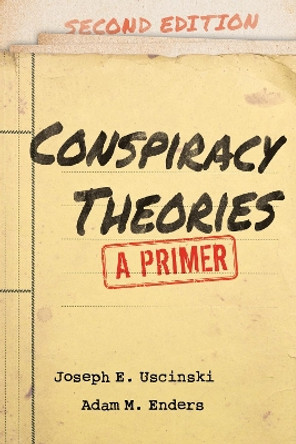We are living in an age of conspiracy theories, whether it's enduring, widely held beliefs such as government involvement in the Kennedy assassination or alien activity at Roswell, fears of a powerful infiltrating group such as the Illuminati, Jews, Catholics, or communists, or modern fringe movements of varying popularity such as birtherism and trutherism. What is it in American culture that makes conspiracy theories proliferate? Who is targeted, and why? Are we in the heyday of the conspiracy theory, or is it in decline? Though there is significant scholarly literature on the topic in psychology, sociology, philosophy, and more, American Conspiracy Theories is the first to use broad, long-term empirical data to analyze this popular American tendency. Joseph E. Uscinski and Joseph M. Parent draw on three sources of original data: 120,000 letters to the editor of the New York Times and Chicago Tribune from between 1890 and 2010; a two-wave survey from before and after the 2012 presidential election; and discussions of conspiracy theories culled from online news sources, blogs, and other Web sites, also from before and after the election. Through these sources, they are able to address crucial questions, such as similarities and differences in the nature of conspiracy theories over time, the role of the Internet and communications technologies in spreading modern conspiracy theories, and whether politics, economics, media, war, or other factors are most important in popularizing conspiratorial beliefs. Ultimately, they conclude that power asymmetries, both foreign and domestic, are the main drivers behind conspiracy theories, and that those at the bottom of power hierarchies have a strategic interest in blaming those at the top-in other words, "conspiracy theories are for losers." But these "losers" can end up having tremendous influence on the course of history, and American Conspiracy Theories is an unprecedented examination of one of the defining features of American political life.
About the AuthorJoseph E. Uscinski is Assistant Professor of Political Science at the University of Miami. Joseph M. Parent is Assistant Professor of Political Science at the University of Miami.
ReviewsThere are plenty of myths and misapprehensions about conspiracy theories and the damage they do. In this path-breaking book, Parent and Uscinski sift fact from fiction to set the record straight about who believes in conspiracy theories, when, why, and with what political consequences. Their answers will surprise you. * David Runciman, University of Cambridge *
This fascinating book tackles some of the thorniest questions about conspiracy theories: who believes them, why do they believe them, and how have these beliefs changed over time? The authors' extensive research shows that Americans are actually less prone to conspiratorial thinking than they were just a few decades ago. Their findings are surprising and sure to provoke debate on this timely and important topic. * Kathy Olmsted, University of California, Davis *
Uscinski and Parent provide the most comprehensive social scientific explanation to date for why conspiratorial beliefs are so prevalent in the United States. Drawing on an eclectic array of original data sources, which remarkably include more than 100,000 letters to the editors of two major newspapers from 1890 to 2010, the authors convincingly identify the features uniting over a century of conspiratorial beliefs. This books is therefore a must read for anyone interested in political misinformation in general, and American conspiracy theories in particular. * Michael Tesler, University of California, Irvine *
Book InformationISBN 9780199351817
Author Joseph E. UscinskiFormat Paperback
Page Count 240
Imprint Oxford University Press IncPublisher Oxford University Press Inc
Dimensions(mm) 155mm * 234mm * 20mm






